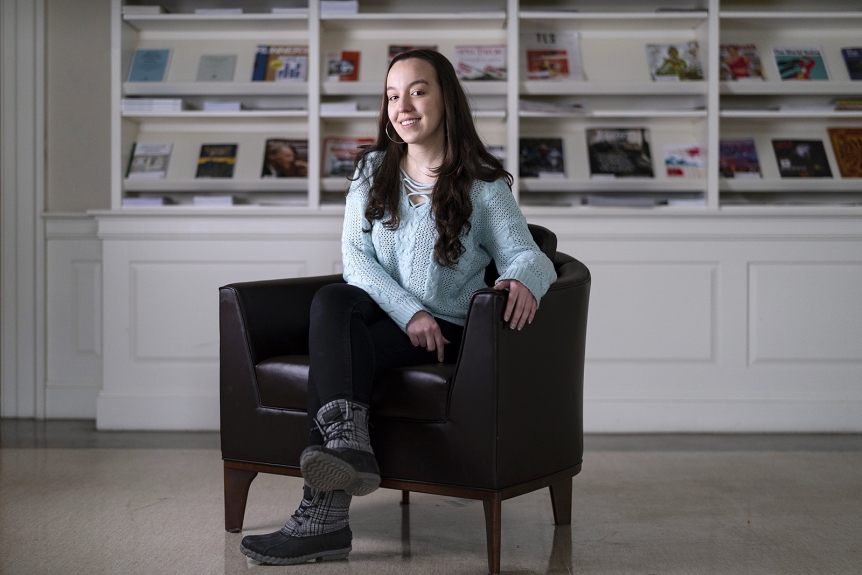Colby College Grantee to Cultivate Communication Skills
by Laura Meader
Funded Projects, Partner Institutions, Americas, Education, Social Cohesion, Technology

This article originally appeared in Colby News.
Think back to the Covid-19 lockdown and how face masks complicated communication. For older adults dealing with cognitive decline, such challenges are part of everyday life. Giovanna Novi ’25 believes that to communicate effectively with this population, we need patience and understanding—and specific skills.
To address this need, Novi has been awarded a coveted 2023 Projects for Peace grant to implement a unique training program to teach effective and respectful communication skills. She aims to promote a caring culture where everyone feels valued, regardless of age.
“This type of project is critically valuable: Older adults often experience stigma, isolation, and discrimination due to communication challenges caused by changes in hearing and vision. Such negative effects are associated with greater cognitive decline,” said Associate Professor of Psychology Jen Coane. “Creating the means to facilitate communication is one essential tool to reduce these effects.”
Novi will use the $10,000 grant to develop a curriculum, build an online platform, and deliver workshops and webinars to caregivers and professionals working with seniors in medical, social service, and retirement-living settings. The beauty of her project lies in its scope and sustainability.
“Since the issue reaches a lot of people,” she said, “the solution needs to reach a lot of people.”
Her project includes a module to train facilitators who can teach the program in other locations. The goal, she said, is to build a network that begins regionally and spreads globally.
‘The coolest class ever’
Novi found her way to Colby from São Caetano do Sul, Brazil, a city near São Paulo.Colby appealed because of its financial aid, emphasis on research, and Legacy Storytellers Program, which offers students the opportunity to meet with individuals living with memory loss and record their life stories. It meshed perfectly with her interest in Alzheimer’s and compassion for the elderly.
Once on campus, Novi majored in Colby’s biology–neuroscience program, which required her to take Introduction to Psychology. “I absolutely loved it,” she said of the course. “It was the coolest class ever.” She added psychology as a second major and developed an interest in cognition and aging along the way.
Last summer, while visiting her family in Brazil, she saw people grow impatient with her grandfather, who suffers from cognitive decline. She knew that doctors talked over him to her father or aunt as if he weren’t in the room. What she had learned in the classroom was at play in her own family.
“We studied cognitive deficits that people start seeing as they age. It extends to different issues like facial recognition, memory, and issues around language and communication,” Novi said. Her academic and personal lives had collided, giving rise to her idea for a Project for Peace.
No time to waste
Novi’s project is underway. This semester she’s developing a curriculum, drawing on her research and coursework. Her workshops will dive into the cognitive, physical, and psychological changes inherent in aging. She’ll also incorporate lectures from experts in the field, such as Coane and Associate Professor of Psychology Tarja Raag, who both support Novi in this project.
To develop communication skills, workshop participants will learn how active listening promotes mutual understanding, the importance of avoiding jargon, ways to promote empathy and trust, and other useful tools. Role-playing and other problem-solving exercises will augment the workshops. Novi will make all of her material available online and offer a professional certificate as an incentive to participate.
This summer Novi will lead two in-person workshops at Lehigh County Aging and Adult Services in Pennsylvania. Logistics dictated her selection of the Lehigh Valley, where she can stay with family friends and cultivate a long-term connection with an area that has a high percentage of adults older than 60 and a robust, healthy-living initiative.
Next fall, she’ll implement her project in Waterville. Her long-term plans include translating the training materials into multiple languages, collecting feedback from seniors impacted by the program, and seeking out other partner organizations.
A space to learn about aging
“Giovanna is one of the most outstanding students I have had the privilege of working with,” said Coane. “She is deeply committed to her academic work and equally invested in multiple projects that have direct and measurable impacts on the community.”
Novi and her classmate Saathvika Diviti ’25 have started a new club at Colby called Generations, which creates a space for students to learn about aging. The club has revived the Legacy Storytelling Program, on hold during the pandemic lockdown, and recruited 10 students to record the stories of five residents at a local memory-care facility.
Novi and Diviti are also both Pulver Science Scholars, which creates a pipeline for the most ambitious and talented students to pursue research at the nation’s top science laboratories. During the academic year, Novi conducts research on neurodegenerative diseases with Colby’s Associate Professor of Biology Tariq Ahmad. Her summer opportunities include work at the Center for Discovery and Innovation and the Nathan S. Kline Institute in the Geriatric Division. Diviti is conducting cancer data-science research this year with Dr. Jeffrey Townsend at the Yale School of Public Health and will spend summer 2023 working with Dr. Loren Walensky at Dana-Farber Cancer Institute.
Sometimes the work feels daunting, Novi said. But she’s bolstered by the resources she’s found on Mayflower Hill.
“There are people right here next to me at Colby who are interested in caring for the older population,” she said. “It’s encouraging in a sense to know there are people who are involved in these topics and subjects.”

